July 13, 2025 – Departure from Taiwan, Arrival in Korea
Hello. Today marks the day Sunim safely completed his Asia lecture tour and departed from Taiwan to return to Korea.
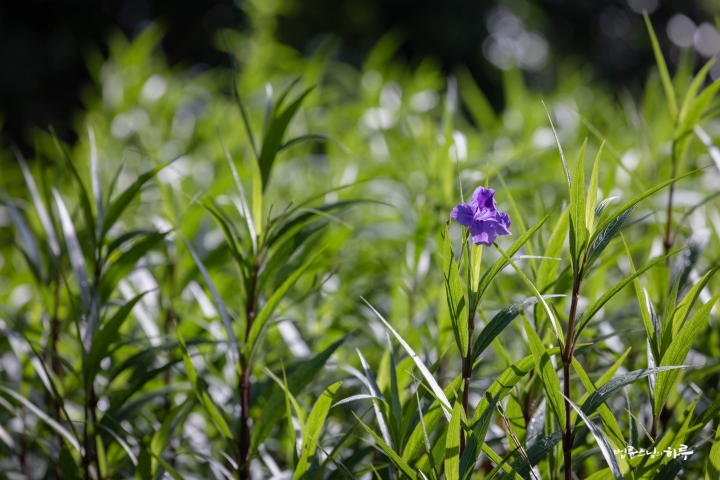
After completing his morning practice and meditation, Sunim began his day with breakfast at 7 AM at his accommodation. After the meal, he went for a walk with Asia chapter volunteers to Daan Forest Park near the accommodation.
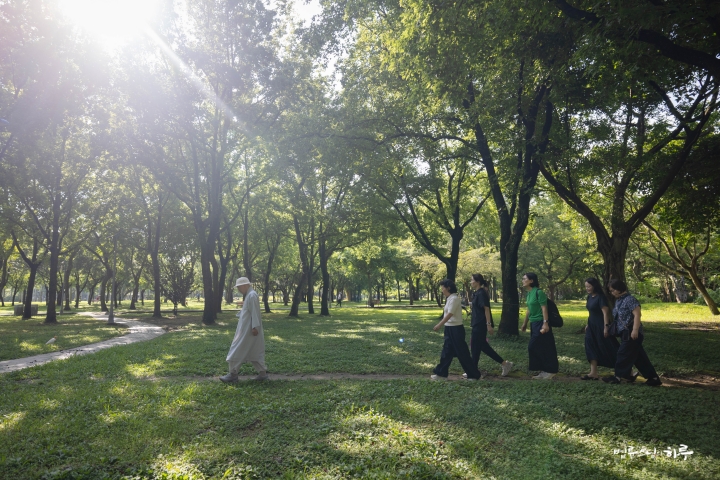
Daan Forest Park is called the ‘lungs of Taipei’ – an ecological park in the city center with lush forests, expansive lawns, ponds, and ecological wetlands.
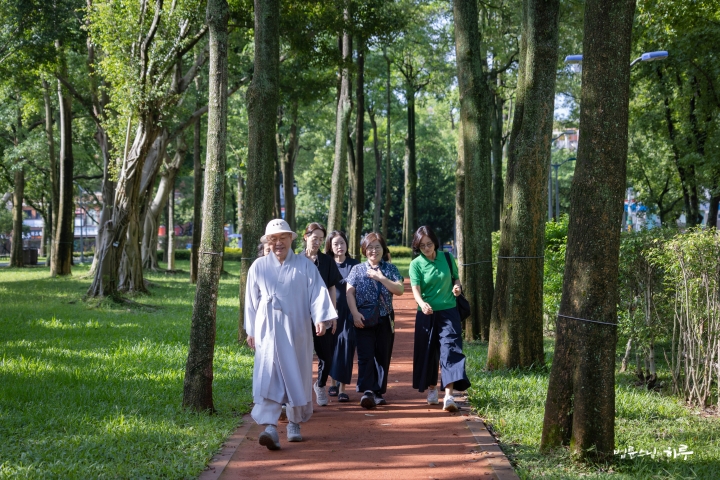
The approximately 26-hectare park was home to dozens of subtropical tree species including yellow flame trees, camphor trees, Bengal fig trees, and Taiwanese maple trees. While strolling through the dense forest paths, they also discussed how to conduct lectures next year.
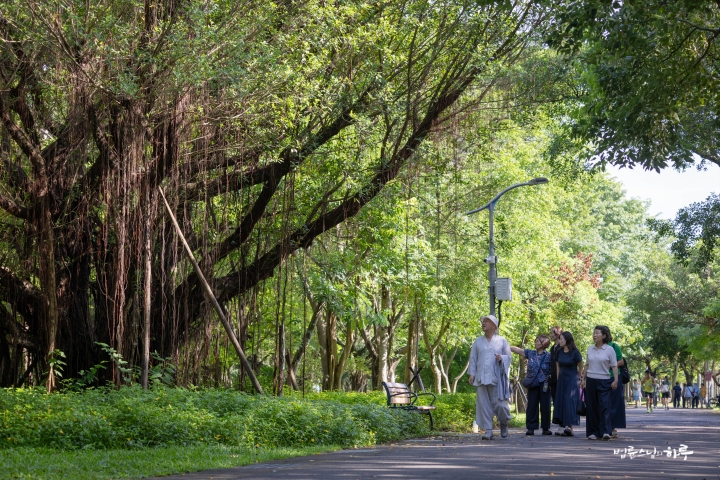
After returning from the walk, a Taiwanese scholar with long-standing ties to Sunim came to visit. This person, who had long researched neuroscience and qigong, engaged in extensive dialogue about peace in East Asia, including relations on the Korean Peninsula and cross-strait relations. After the conversation, Sunim introduced the Asia chapter volunteers to the guest. The guest offered heartfelt advice to the Asia chapter volunteers.
“Venerable Pomnyun Sunim doesn’t spend even one second for himself. He dedicates all his time solely for the world. While you can be by Sunim’s side, please ask and learn whatever you can.”
“Yes, thank you.”
After seeing off the guest, Sunim exchanged farewell greetings with the Asia chapter volunteers who had accompanied him throughout the Asia lecture tour.
“Thank you all for your hard work.”
“Sunim, please have a safe journey back.”
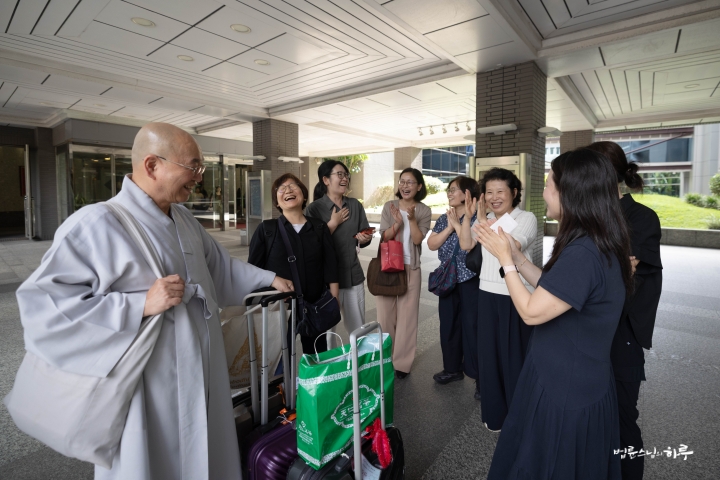
After exchanging farewells, they headed to Taiwan Taoyuan International Airport at 3:40 PM.
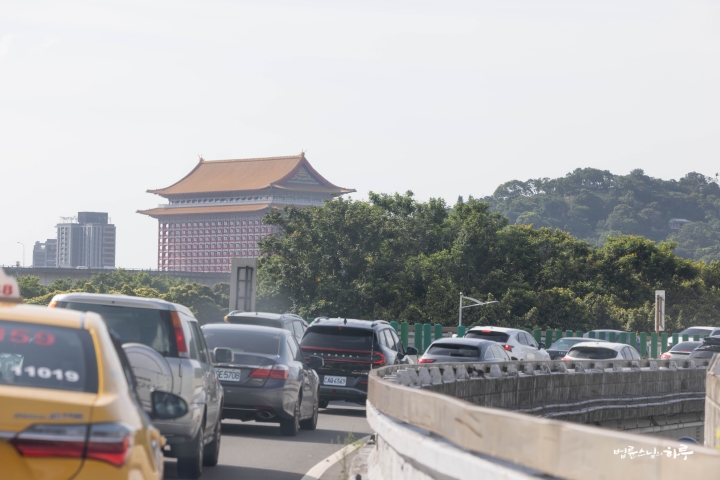
After arriving at the airport at 4:30 PM, Sunim exchanged farewell greetings with Taiwan Jungto members.
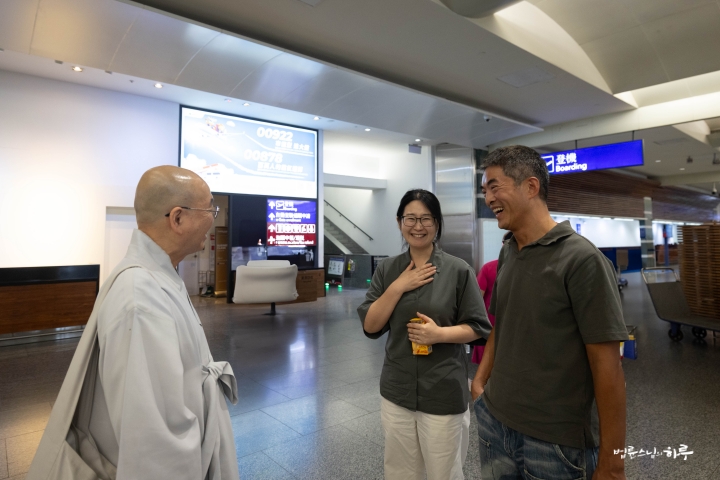
After completing departure procedures, he moved to the boarding gate and worked on manuscript editing and other tasks until flight departure time.
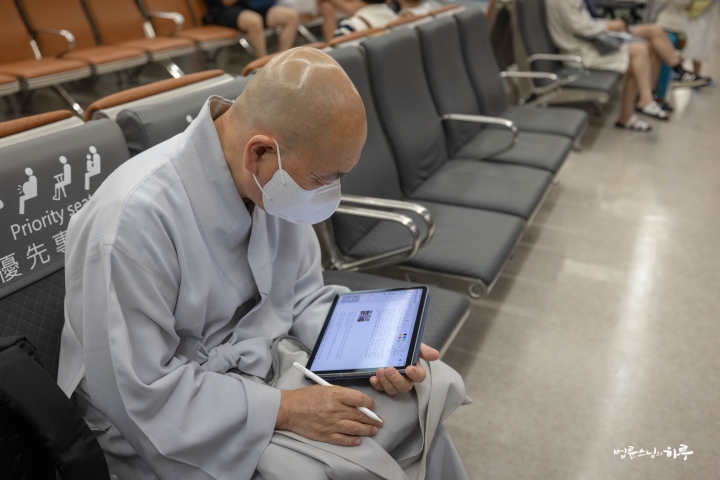
The flight scheduled to depart at 6:55 PM was delayed by 25 minutes and took off at 7:20 PM.
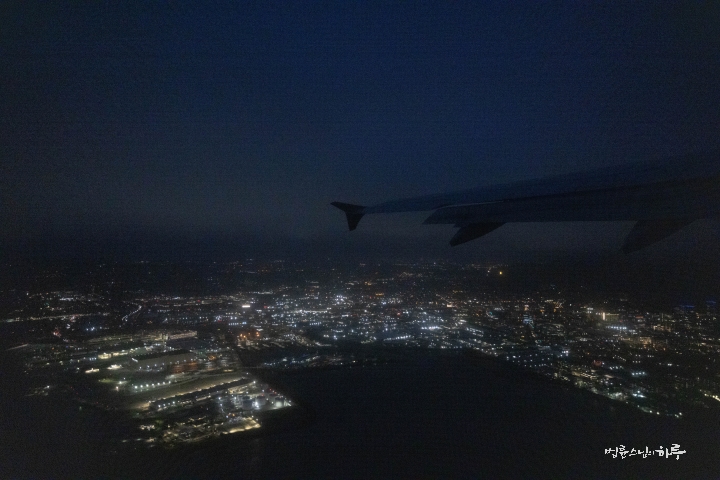
After a 2-hour and 40-minute flight, the plane landed at Incheon International Airport at 11 PM local time.
After completing immigration procedures and exiting the airport, practice team volunteers welcomed Sunim back from successfully completing the Asia lecture tour.
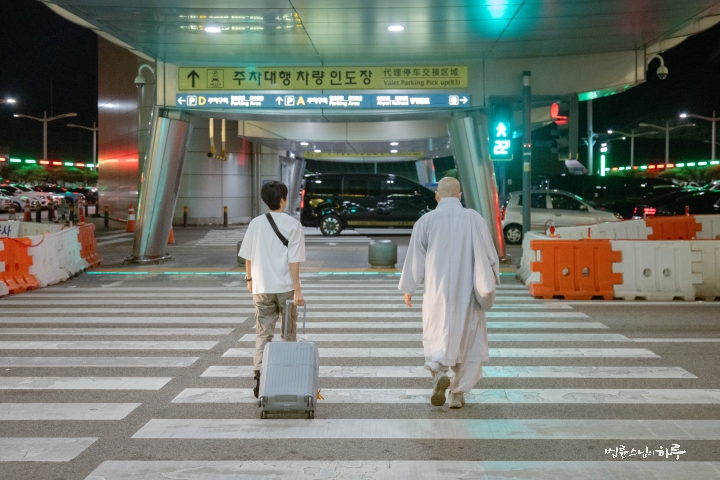
“Sunim, did you have a good trip?”
“Yes, I had a good trip.”
They immediately headed to Seoul Jungto Center by car. The sweltering heat that had reached 36 degrees until yesterday had subsided, and a pleasantly cool breeze was blowing.
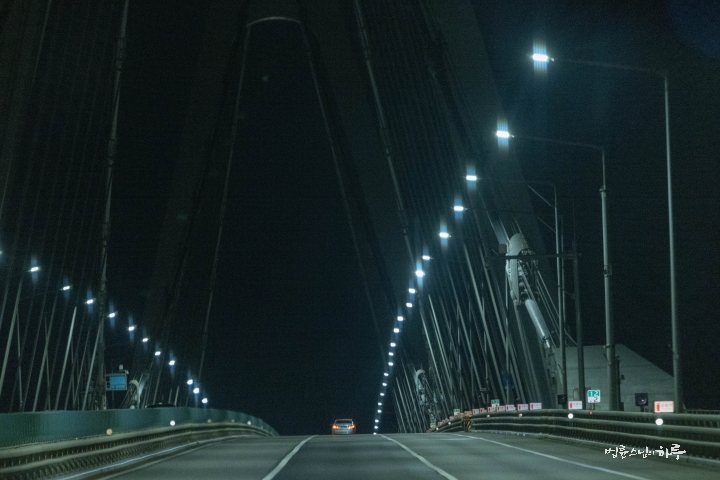
Arriving at Seoul Jungto Center close to 1 AM, Sunim unpacked and went to bed. The Asia lecture tour was successfully completed.
Tomorrow, Sunim will attend the opening ceremony of the International Reconciliation Conference under the theme ‘Inter-religious Dialogue in Asia for Reconciliation and Peace,’ having invited a Sri Lankan religious group to Korea. This will be followed by a 4-night, 5-day journey including dialogue sessions and visits to Korean religious institutions and the Unification Observatory.
Since there was no Dharma talk today, I’ll conclude by sharing a dialogue between a questioner and Sunim from the Dharma Q&A held in Hong Kong on the 11th.
Do You Have a Special Secret for Finding Happiness in Daily Life?
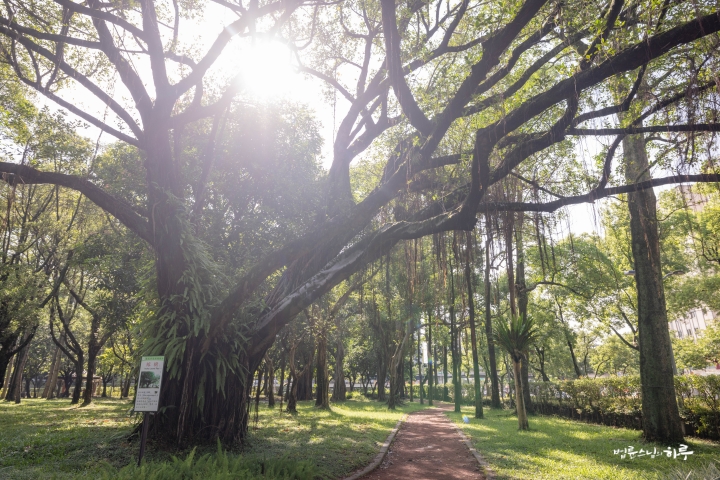
“First, your current state is completely normal. When we’re young, there are things that make us laugh heartily and things that make us sad. However, as we age and experience various things, we realize this isn’t a big deal, and neither is that. For example, when you’re in middle or high school, you make a huge fuss about your grades going up or down on monthly exams as if it’s a catastrophe, but looking back now, does it really matter whether your grades went up or down a bit on the second-year middle school final exam? It doesn’t, right?
When you’re in your sixties looking back, would it really matter that you repeated a year of study? It wouldn’t feel that important, would it? Similarly, when you experience various things in life, what seemed important at the time often turns out to be unimportant in retrospect, and conversely, what didn’t seem important at the time sometimes turns out to be quite significant later. As we live our lives, unless we develop mental illnesses like depression, it’s normal for our emotional highs and lows to gradually diminish. People say their emotions have become dull, but actually, that’s a normal state. The emotional state you’re experiencing now is very normal.
Second, what in life is truly distressing? When you think about it, is divorce between two people really distressing? We all originally lived alone, didn’t we? Then we thought it would be nice to live together and got married, but after living together, it wasn’t so great, so we separated. What’s the problem with that? It’s just one of many ways of living – we tried living together, and we tried living alone. Divorce just means returning to the state before marriage. So how could that be a big deal? When you examine it carefully, it’s not a big deal.
If cancer was discovered at the hospital today, is that a catastrophe? The cancer didn’t develop today. It was there yesterday and the day before. If it’s a catastrophe, it was a catastrophe yesterday and the day before too, so why does it suddenly become a catastrophe today? Is discovering cancer bad news? Then would not discovering it be good news? Of course, discovering it is good news. So today isn’t a day when something bad happened, but rather when something good happened. The cancer was already there, and today is just the day I became aware of it. Yet if you say ‘something bad happened today,’ that means ‘it would have been better if the cancer hadn’t been discovered.’ If it would have been better not to discover the cancer, why did you spend money on cancer screening? You got tested specifically to find cancer, didn’t you? So you could tell the doctor, ‘Congratulations! You finally found it. Well done!’ Before, you didn’t know, so you couldn’t respond to it, but now that you know there’s cancer, you have more choices. You can choose to leave the cancer alone and live like yesterday, you can choose surgery, or you can choose to respond in other ways. If discovering cancer today makes you miserable, it’s because you’re attached to the thought that you wish you didn’t have cancer.
When you examine things one by one like this, there’s nothing particularly special about living. Whatever conversation Sunim and you have, the root of that dialogue is that it’s all no big deal. As we live, this happens and that happens. When people come to me at weddings asking me to write ‘Congratulations,’ I don’t write it. Because we don’t know yet whether marriage is a good thing or a bad thing. You all received many congratulations when you got married, but when you actually live married life, you say you’re dying because of it. You rejoice when you have a child, but then complain about how hard it is to raise them. You have a celebration party when you get a job, then suffer because of work life. You’re overjoyed when you open a store, then suffer because of the store. What you thought was good ultimately becomes the cause of suffering.
The reason Sunim doesn’t share in your joy about things you like isn’t because Sunim is jealous of your happiness. It’s because looking at you, what’s good often becomes bad, so let’s reserve judgment a bit. Let’s watch a little longer to see whether it will be a good thing or a bad thing. If you have this perspective of observing with a little distance, ultimately nothing is a big deal. The phrase ‘it’s no big deal’ is very important. Like the saying ‘life is unpredictable,’ what starts as good doesn’t necessarily remain good. What’s bad can’t necessarily be said to be only bad. So there’s no need to get too excited about what happens. What’s important is thinking about how to resolve things rationally.
For example, suppose someone asked, ‘I’m so sad because someone I love died. How can I eliminate this sadness?’ But if we consider whether anyone has not died since the birth of humanity until now, how could someone dying be a big deal? Death is something that always happens, isn’t it? I’m not saying you shouldn’t be sad. I’m saying that when something happens and you examine it carefully, it’s ultimately no big deal.
You told your child to brush their teeth and go to bed at 10 PM, but the child didn’t brush their teeth past 10 PM and just watched TV, making you very angry. But if the child suddenly died in an accident, would it matter whether they brushed their teeth or went to bed at 10 PM? It wouldn’t matter at all. When you understand this principle, it’s fine if the child doesn’t brush their teeth, fine if they don’t sleep at 10 PM – just being alive is enough to feel good.
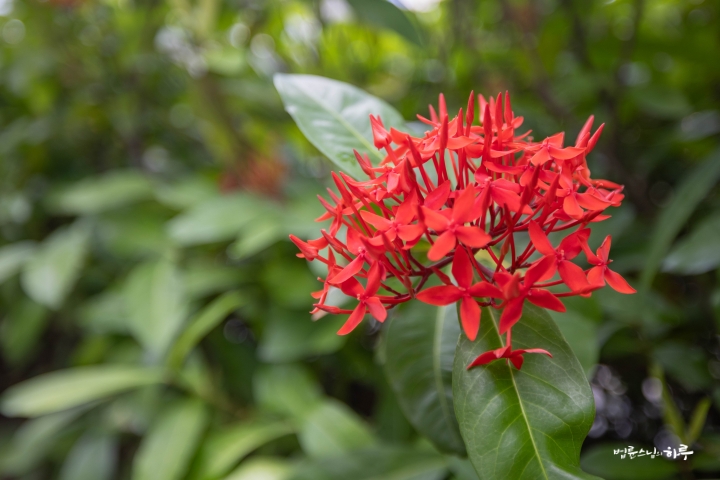
The small happiness I feel is simply ‘I’m not dead, I’m alive!’ That doesn’t mean I desperately want to live. But isn’t it wonderful to open your eyes in the morning and find yourself alive? Losing money, a husband having an affair, a wife leaving home – all these problems arise because we wake up in the morning and are alive, don’t they? If we don’t open our eyes in the morning, these problems don’t arise. They’re all problems that occur because we’re alive.
When I visit war-torn areas, my heart truly aches. The scenes are so tragic that I sincerely hope wars never happen. But those who start wars have various reasons – ‘We must unify,’ ‘We must reclaim our territory,’ ‘We must protect something.’ Whatever their reasons, I simply wish that wars wouldn’t happen. When I visit refugee camps in war-torn countries, I meet people who have survived for 10 years solely on food provided by the UN. If I imagine myself in their position, it seems there would be no hope and it would be suffocating. Since I also experienced hunger due to extreme poverty in my childhood, I hope that people in absolute poverty can at least eat well. I hope sick people can receive treatment, and that children can receive basic elementary education regardless of their circumstances. I don’t expect these children to become successful when they grow up. I’m only providing support to the level where I think, ‘If I were in that situation, I would want at least this standard of living.’ Even doing just this work keeps me incredibly busy. But I don’t think this work must be done. Since I’m alive and not dead right now, I want to do this work while I’m alive.
The time when I reach the most selfless state (無我之境) is not during meditation, not during chanting, but when I’m farming. When I’m farming and someone calls, ‘Sunim, it’s time to go give a Dharma talk,’ I feel slightly bothered. So at the end of my life, I plan to become a farmer. Previously, I planned to live as a monk only until age 70, and then live as a farmer afterward. But now I’m over 70 and still haven’t retired. I wonder if I’ll be able to live that way when I turn 80.
I never think ‘Why are you talking about such useless things?’ no matter what questions you ask. As the saying goes, ‘The thorn under my fingernail hurts the most’ – everyone feels their own worries are the biggest problems. So I listen carefully to each person’s concerns. But when I listen to your worries, they’re really not big deals. I listen because you’re earnestly sharing, but when you really listen, they’re all minor issues. Today too, many people shared their concerns, but was there anything special? After talking with me, you realized they weren’t big deals, right? If you live life with the perspective that ‘My current worries are not a big deal,’ hope emerges.”
“Thank you. I understand well.”





